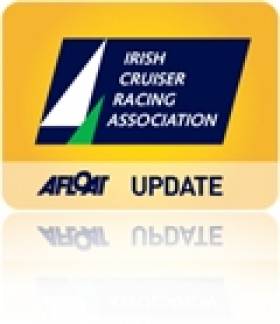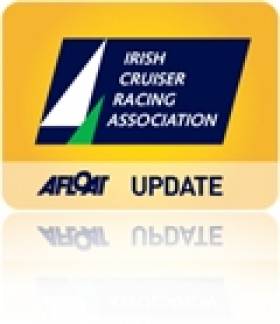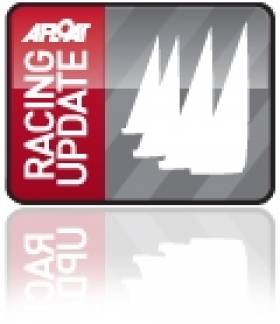Displaying items by tag: Catapult
O'Leary to Captain Potent Irish Commodore's Cup Team
#commdorescup – Although Ireland will be setting sail for Cowes as a potent Commodore's Cup force this July it will only be a single team as a second 'corinthian' team could not be mustered. At the Spring meeting of the ICRA executive, Commodore's Cup team manager Barry Rose made a detailed report on preparations. The meeting heard the team will sail without the support of sponsorship, in spite of major effort by the Irish Cruiser Racing Association (ICRA) to secure a team sponsor none had been found.
Anthony O'Leary has been confirmed as team captain, a position he also held in the 2010 Commodores' Cup winning Irish team.
As has been widely reported the three boat Irish team consists of Catapult, a US based Ker 40 which had been shipped to the Solent and was due to be enter the water to start her training programme on the 1st May.
Quokka, a Grand Soleil 43, had been chartered by Royal Irish sailors Michael Boyd and Niall Dowling. O'Leary's Antix, a Ker 39, completed the line-up.
The services of meteorologist Mike Broughton had again been secured on an exclusive basis to provide local tactical and Solent tidal support to the team.
Irish Commodore's Cup 'Green Team' Named; Antix, Catapult & Quokka
#commdorescup – An American and a British yacht will join Royal Cork's Antix to form the 'Green Team' to win the Commodore's Cup for Ireland it has been officialy announced. The three boat team is Catapult, a Ker 40 owned by Mark Glimcher of the United States; Anthony O'Leary's Ker 39, Antix from Royal Cork; and the RORC Yacht Quokka, a Grand Soleil 43, being chartered by Royal Irish sailors Michael Boyd and Niall Dowling. There will be a strong Irish crew involvement on all three boats comprising of sailors who first won the Cup for Ireland in 2010. Crew list announcements are expected to follow.
In what was sailing's worst kept secret of the year so far the Irish Cruiser Racing Association (ICRA) finally announced this morning the Irish team line–up for this Summer's Cup. Details of the team were previously reported on Afloat.ie
ICRA has been working for some time to assemble a top level Irish Team for this year's event, taking place off Cowes, Isle of Wight between 19th and 26th July 2014.
Catapult has won the US IRC Nationals, Cork based Antix is a seasoned and successful campaigner and a winning Commodores' Cup team member in 2010. Quokka is an extremely competitive IRC boat with a strong track record. The Team's campaign will begin with the Warsash Spring Series in the Solent followed by various other regattas including the UK IRC Championship in mid-June.
ICRA Commodore, Norbert Reilly welcomed the development of such a high calibre team. ICRA also say they have serious interest from a fourth boat to form a second team and are inviting interest from another two boats to form Ireland Orange Team.
#QKeyWest – Future Irish Commodore's Cup yacht Catapult with Cork's Peter O'Leary at the helm lies third overall and five points off the lead in IRC 3 of Quantum Key West regatta today. Broad smiles and weary bones usually means a successful day on the water for sailboat racers. There was plenty of both on the docks around the Conch Republic on Wednesday after organizers of Quantum Key West 2014 completed three races in strong winds.
Northerly winds that held steady from 12-16 knots provided the best racing conditions yet for the 10 classes on three divisions. After completing three races combined on Monday and Tuesday, the competitors were thankful for the full day's work.
"It was another beautiful Key West sailing day. That's why we all keep coming back here," said Alec Cutler, skipper of the Melges 32 Hedgehog.
Cutler was particularly pleased after surviving an on-course-side start and maintaining the overall lead for the third straight day. Hedgehog was over early in the opening race on Wednesday, but battled back to place second.
"That was our best race yet considering the circumstances. We clawed our way back through the fleet," said Cutler, who is three points ahead of Dalton DeVos and the Delta team.
Completing three races caused a shakeup in the standings in many classes, including IRC 2. Ran, the British entry skippered by Niklas Zennstrom, posted a solid line of 4-1-2 for the day to take over the lead among the six 52-footers. Adrian Stead is calling tactics while fellow Briton Nick Asher is serving as strategist aboard Ran, which now leads Azzurra by one point.
"Our starts were strong and that allowed us to go where we wanted to go," Asher said. "We've gotten ourselves into contention, but we need to keep plugging away. Tomorrow is the big day. There will probably be three more races and that's going to determine a lot."
Quantum Racing, which led the 52 Class for two days, suffered some bad luck in the first race today - hooking a lobster pot and having to stop the boat in order to get it clear. That mishap resulted in a sixth place finish, but skipper Doug DeVos and crew remain in third overall just two points behind Ran.
Bella Mente, the Judel-Vrolijk 72-footer skippered by Hap Fauth, snatched the lead in the Mini Maxi class by a point over Caol Ira R (Alex Schaerer, Newport, RI). Shockwave, the third entry in the class, retired after suffering a mechanical failure during the first race of the day and is in third place. Skipper George Sakellaris expected the broken part to be fixed in time for Shockwave to resume racing on Thursday.
Arethusa, a Swan 42 skippered by Phil Lotz of Fort Lauderdale, Fla., had a real strong day with a line of 1-3-2 and now leads IRC 3 by four points. Veteran professional Jeff Madrigali is calling tactics aboard Arethusa, which overtook fellow Swan 42 Vitesse (Jon Halbert) for first place.
"It was really a fantastic day of racing and we really appreciate getting three races in," Lotz said. "We had good conditions for the Swans. It wasn't quite windy enough for the lighter boats to plane. I thought we did a good job of shifting gears and staying in phase."
Little Wing, the Italian entry owned by Nicola Ardito, has put forth a dominant performance in Melges 24 class. Hugo Rocha, a three-time Olympian and 1996 bronze medalist in 470 class for Portugal, is calling tactics on Little Wing.
"The wind was very shifty and Hugo did a very good job of putting the boat in the right place," helmsman Enrico Zennaro said. "Our boat speed is very good. We have been able to make big gains on the course."
That was evident in Wednesday's first race when Little Wing went from fifth to first on the final leg, catching a big puff just before the finish to pass a couple boats.
There is also a new leader in J/70 class, largest of the regatta with 60 boats. North Sails professional Tim Healy steered Helly Hansen to a couple seconds and a third on Wednesday to take control with a low score of 29. Catapult, skippered by Joel Ronning of Minneapolis, Minn., is 12 points behind in second.
Geoff Becker is calling tactics upwind while John Mollicone is doing the honors downwind for Healy (Jamestown, RI), the defending regatta champ.
"Going downwind we were in-between planing and displacement mode so you had to decide when to keep the bow up and the jib out," Healy said. "There were big gains and losses to be made downwind."
Healy explained that a J/70 begins to plane in around 15 knots of breeze and attempting to do so when the wind is not strong enough causes the boat to really slow down. "It's crucial to know when to soak it low," he said.
Decision and Spookie, a pair of Carkeek 40-footers, have engaged in a great duel in the High Performance Class. Decision led at the end of racing on Monday and Tuesday, but has surrendered the lead to Spookie, which won two races and placed second in the other on Wednesday. Skipper Steve Benjamin was particularly pleased about the second considering that Spookie was over early at the start and was able to pass two boats on the course.
"We got good starts in the last two races of the day, stayed in phase for the most part and were able to go around the corners cleanly," said Benjamin, a key figure in developing the High Performance rule.
Dobbs Davis, U.S. editor for Seahorse Magazine and another leading proponent of HPR, said the competition at Key West this week has been the closest in the brief history of the class. "The deltas between the first and fourth place have been the smallest of any HPR regatta held to date," he said.
Spaceman Spiff and Team Fireball, a pair of J/111s, are duking it out in the eight-boat PHRF 1 class. Spaceman Spiff, sailed by Rob and Ryan Ruhlman of Cleveland, Ohio, pulled ahead by 2 ½ points based on the results in Wednesday's last race. Spaceman Spiff tied the J/122 El Ocaso for third place on corrected time while Fireball, skippered by Eddie Fredericks of Annapolis, suffered a sixth place finish.
"We feel good about the way the boat is moving. I think the key for us has been minimizing mistakes and recovering from the few we have made," Rob Ruhlman said. "We have sailed conservatively, especially at the starts."
PHRF 1 was deemed the most competitive class at Quantum Key West on Wednesday and that earned Teamwork the Mount Gay Rum Boat of the Day honor. Skipper Robin Team steered his J/122 to three bullets as Teamwork jumped from sixth to third in the overall standings.
"We had a little pep talk this morning at breakfast and reminded everybody what we are capable of when we are focused and determined," Team said. "We had epic conditions today and our team loves that type of breeze. Our tactician, Jonathan Bartlett, was on fire. He hit every shift all day long."
Vayu2, skippered by Ron Buzil of Chicago, is running away with the 14-boat J/80 class. Professionals Jahn Tihansky and Andrew Kerr are helmsman and tactician, respectively, aboard Vayu2, which has won four races and finished second in the other two in building a commanding 12-point lead over Rumor (John Storck Jr., Huntington, NY).
Skipper Bill Sweetser and his team aboard Rush have maintained the lead in PHRF 2 for three straight days. Sweetser has steered the J/109 to first in four races and second in the other two.
































































